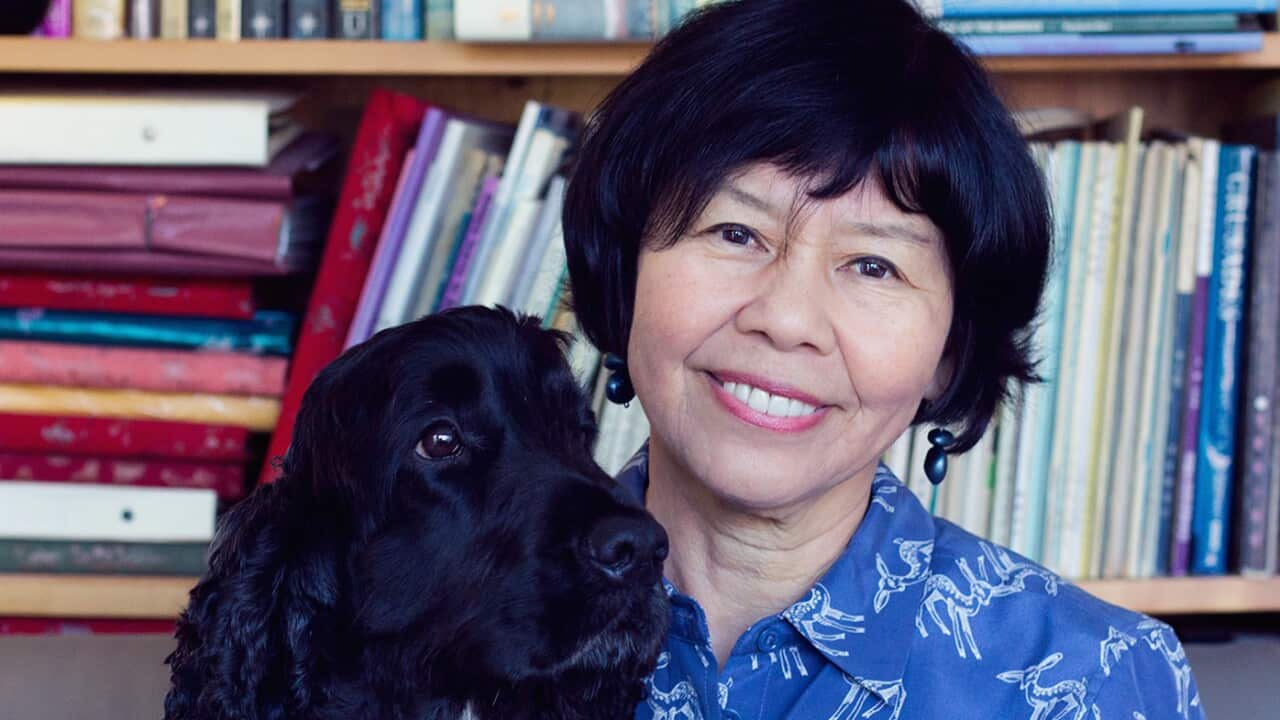Key Points
- Funding for Trove was due to stop as of the new financial year.
- More than 22,000 people petitioned the government saying the website is a valuable resource for all Australians.
- Author Gabrielle Wang's Trove research leads to uncovering family history in surprising article find
An article in a newspaper dated 18 November 1887 provided a glimpse into the wedding of Gabrielle Wang’s great grandparents, immigrants to Australia from China, which could have otherwise been lost with the passing of time.
Ms Wang, a children’s book author and illustrator, said the article, found on the digitised database, Trove, provided her a portal into her family’s past she would be unable to find anywhere else.

Gabrielle Wang is a children's author and illustrator who uses Trove to inform the characters and places in her stories. Source: Supplied / Gabrielle Wang
Trove has not only provided her a portal to her own family’s early beginnings in Australia but much of the historical context for many of the books she has written.
Described as the "memory house of the nation" Trove has been given a federal budget lifeline, to keep it available to Australians for another four years.
So what exactly is Trove, how has it helped so many people from different walks of life and why was it at risk in the first place?
A digital database
Trove is a free online resource known best for its searchable collection of Australian publications going back a couple of hundred years but it also features many other cultural artefacts including recordings, collections of photographs and of records of Indigenous languages.
It contains more than 14 billion digitised artefacts and stories, 26 million newspaper pages and more than 1200 records of Australian and Torres Strait Islander languages.

Source: SBS News
Trove receives 20 million hits a year and is well-used by historians and people undertaking family history research.
Funding had been due to stop
Last year the National Library of Australia (NLA), which is responsible for the platform, had warned that unless the federal government committed millions of dollars, Trove would cease to exist as of June 2023 when federal funding was due to run out.
Towards the end of last year, a campaign to save the online database gained momentum.
A petition with more than 22,000 signatures was submitted to parliament in February.
It requested full funding for what it called the "memory house for the nation".
“So that the nation's memories can be accessed by all Australians and provides them with the opportunity to understand and know our own history,” the petition request read.

People can access Trove for free and search many different collections by word and date including copies of newspapers that go back 200 years. Source: Getty / selimaksan
Federal Budget funding for Trove
Arts Minister Tony Burke released a statement on Monday to say the government would provide the NLA with $33 million over four years in the Budget to fund Trove.
“Trove is, in many ways, Australia’s digital memory,” Mr Burke said.
“This funding helps restore and maintain our strong cultural infrastructure – ."
The funding commitment will continue for a period beyond the next election, with $9.2 million ongoing and indexed funding from July 2027, in order to avoid another last-minute call on its future.
An announcement from the NLA online welcomed the funding and the certainty it would bring saying it “would allow the National Library to continue to provide this essential service, enrich it with new content, and stabilise and secure the platform.”
“The overwhelming support we have received from the Trove community (both new and old) has been humbling.”
History that is informing children of today
Ms Wang, who is also the current children’s laureate said she turned to Trove when working on historical fiction titles for young readers.
Among the settings and characters she has written about are a young girl living in Beechworth, Victoria during the gold rush days of the 1850s and 1860s and a story set in Darwin during the Japanese bombing of the town.
“It was just amazing to see articles that were written in that day or even just looking at the advertisements that were in the local papers or what was happening at the time,” Ms Wang said.
She said while much of the information may still exist without Trove, it would not be as easy for people to navigate and find and it could be forgotten or destroyed and lost from written history altogether.
“This is part of our history, and if it's not digitised, it’s just sitting in a library somewhere and may not be as readily accessed,” she said.
A Chinese wedding
On a personal level, the most impressive detail Ms Wang had come across on Trove was the mention of her great grandparent’s wedding in country Victoria almost 140 years ago.
The event, which perhaps received so much column space because of Ms Wang's great grandfather being quite well known as a store owner in Wahgunyah, was detailed in a 964 word article in the Corowa Free Press.

Gabrielle Wang's great grandmother, pictured here with her children, was described in the article . Source: Supplied / Gabrielle Wang
Ms Wang said while parts of the piece could possibly be considered racist today, it was a "true reflection of the time."
However with all of its "flowery" language, she felt the local journalist had written it with a "deep affection".
"I love the colourfulness of it," Ms Wang said.
"What is amazing, and we never would have seen this if it wasn't digitised on Trove, is that their whole wedding ceremony was there, it was right there," she said.
"Trove is definitely a treasure, and hopefully it can just keep going."


